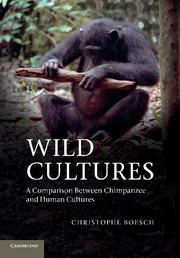Book contents
- Frontmatter
- Contents
- Acknowledgments
- Introduction
- 1 Studying culture in the wild
- 2 From human culture to wild culture
- 3 Shaping nature into home
- 4 One for all and all for one
- 5 I want to have sex with you
- 6 Learning culture
- 7 Dead or alive? Towards a notion of death and empathy
- 8 Wild culture – wild intelligence
- 9 Uniquely chimpanzee – uniquely human
- Epilogue: Will we have the time to study chimpanzee culture?
- References
- Index
6 - Learning culture
from pupils to teachers
Published online by Cambridge University Press: 05 October 2012
- Frontmatter
- Contents
- Acknowledgments
- Introduction
- 1 Studying culture in the wild
- 2 From human culture to wild culture
- 3 Shaping nature into home
- 4 One for all and all for one
- 5 I want to have sex with you
- 6 Learning culture
- 7 Dead or alive? Towards a notion of death and empathy
- 8 Wild culture – wild intelligence
- 9 Uniquely chimpanzee – uniquely human
- Epilogue: Will we have the time to study chimpanzee culture?
- References
- Index
Summary
Two types of education need to be distinguished, as their products are very different: the education of the individual that is common to humans and the animals, and the education of the species that belongs only to humans
George de Buffon (Histoire Naturelle des Quadrupèdes, 1762)Taï National Park, Côte d’Ivoire, 12 February 1986
Salomé is cracking Coula nuts with a hard wooden hammer and, as usual, 5-year-old Sartre is sitting in front of her and eagerly begging for a share. Her hesitation to give him kernels indicates to me Salome’s increasing reluctance to share. Instead of starting to pound nuts himself, to my surprise, Sartre collects a load of nine nuts that he brings back and adds to Salomé’s heap next to the anvil, thereby taking over the task from his mother so that she can crack more nuts without having to do all the collecting. Then after his mother refuses to share the first nut, Sartre immediately cleans the anvil of all shell remains from the previous nut, as she regularly does, and places a fresh nut for her to pound. Salomé waits for her son to finish these preparations before pounding this nut. Once open, Sartre begs for it and this time she lets him take about a third of the kernel. Salomé now concentrates only on pounding the nuts and Sartre goes on regularly collecting them for her. From this point on, nut-cracking has acquired a cooperative dimension between the two: nuts that are collected by Sartre and cracked by Salomé are partly shared with Sartre, while nuts collected and placed on the anvil by Sartre are invariably shared with him.
- Type
- Chapter
- Information
- Wild CulturesA Comparison between Chimpanzee and Human Cultures, pp. 128 - 154Publisher: Cambridge University PressPrint publication year: 2012



